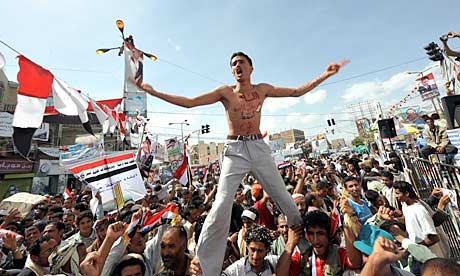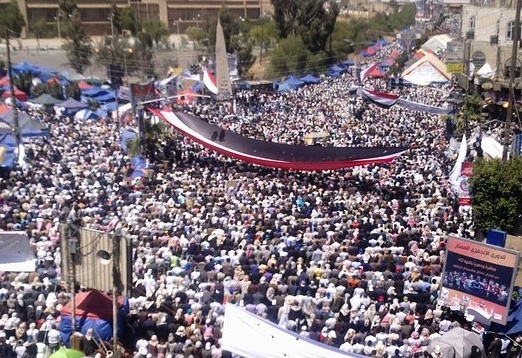http://www.counterpunch.org/patrick06022011.htmlJune 2, 2011
No NATO Bombs for King Hamad al-Khalifa
Bahrain Regime's Onslaught on Pro-Democracy WomenBy PATRICK COCKBURN
Bahrain's security forces are increasingly targeting women in their campaign against pro-democracy protestors, despite the official lifting of martial law in the island kingdom yesterday.
The ending of martial law and a call for dialogue from King Hamad bin Isa al-Khalifa, appear to be part of a campaign to show that normal life is returning to Bahrain.
The Bahraini government is also eager to host the Formula One motor race, which was postponed from earlier in the year, but may be rescheduled to take place in Bahrain by the sports governing body meeting in Barcelona tomorrow.
There are growing signs that Bahraini police, riot police and special security are detaining and mistreating more and more women. Many are held incommunicado, forced to sign confessions or threatened with rape according to Bahraini human rights groups.
Ayat al-Gormezi, a 20-year old poet and student at the Faculty of teachers in Bahrain, was arrested on March 30 for reciting a poem critical of the government during the pro-democracy protests in Pearl Square, the main gathering place for demonstrators, in February. She was forced to give herself up after police raided her parents' house and made four of Ayat's brothers lie on the shore at gunpoint. She was not there at the time. One policeman shouted at their father "tell us where Ayat is in fifteen minutes or we will kill each of your sons in front of your eyes."
Masked police and special riot police later took Ayat away telling her mother that her daughter would be interrogated and would have to sign a document. Her mother was told to pick up her daughter from "Al-Howra" police station, but has not seen her since her arrest. She did speak to her once on the phone when Ayat told her that she had been forced to sign a false confession. Her mother has been told confidentially that Ayat is in a military hospital as a result of injuries inflicted when she was tortured.
Film of Ayat addressing a cheering crowd of protestors in Pearl Square at night in February shows her to be a confident-sounding young woman in a black abaya. At one point in her recitation she says "we are the people who will kill humiliation and assassinate misery, we are the people who will destroy the foundation of injustice." At the end of her poem she addresses King Hamad directly and says to him of the Bahraini people "don't you hear their cries, don't you hear their screams." As she finishes the crowd shouts "Down with Hamad."
Ayat's call for change was no more radical than that heard in the streets of Tunis, Cairo and Benghazi at about the same time in the heyday of the Arab spring. But her reference to the king might explain the visceral fury shown by the Bahraini security forces who, going by photographs of the scene, smashed up her bedroom when they first raided her house and could not find her.
Bahrain is the first country affected by the Arab Spring where women have been singled out as targets for repression. Bahraini human rights groups say that hundreds have been arrested. Many women complain of being severely beaten while in custody and one woman journalist was beaten so badly that she could not walk.
In another case, a woman doctor, who was later released but may be charged, says she was threatened with rape. She told Reuters news agency that the police said: "We are 14 guys in this room, do you know what we can do to you? It's the emergency law [martial law] and we are free to do what we want."
Despite the lifting of martial law, first imposed on March 1, there is no sign of repression easing. Some 600 people are still detained, at least 2,000 have been sacked from their jobs, and some 27 mosques of the Shia, who make up 70 per cent of the population, have been bulldozed.
The protests started on February 14 in emulation of events in Egypt and Tunisia with a campaign for political reform, a central demand being civil and political equality for the majority Shia. The al-Khalifa royal family and the ruling class in Bahrain are Sunni.
The targeting of women by the security forces may, like the destruction of Shia mosques, have the broader aim of demonstrating to the Shia community that the Sunni elite will show no restraint in preventing the Shia winning political power.
Shia leaders complain that the state-controlled media is continuing to pump out sectarian anti-Shia propaganda.
The government is eager to show that Bahrain can return to being an untroubled business and tourist hub for the Gulf. Having the Formula One race rescheduled to take place on the island towards the end of the year would be an important success in this direction.
The New York-based Human Rights Watch has written to the Federation Internationale de l'Automobile (FIA), which meets in Barcelona tomorrow, saying that the motor race would take place in an environment of unrelenting "punitive retribution" against pro-democracy protestors, who are being charged on absolutely no evidence, of being part of an Iranian plot against the government.
Ironically, if the Formula One race does go ahead it will be without a quarter of the staff of the Bahrain International Circuit, the host of the motor race, who have been arrested, including two senior staff. Most have been sacked or suspended, accused of approving of the postponement of the Formula One event earlier in the year.
In a bid to stem the flow of bad publicity the government is relying primarily on suppressing news by detaining and beating local reporters.
The one international journalist based permanently in Bahrain earlier this month was ordered out of the country. Even foreign correspondents who have obtained entry visas have been denied entry when they arrive in Bahrain.
Patrick Cockburn is the author of "Muqtada: Muqtada Al-Sadr, the Shia Revival, and the Struggle for Iraq.










